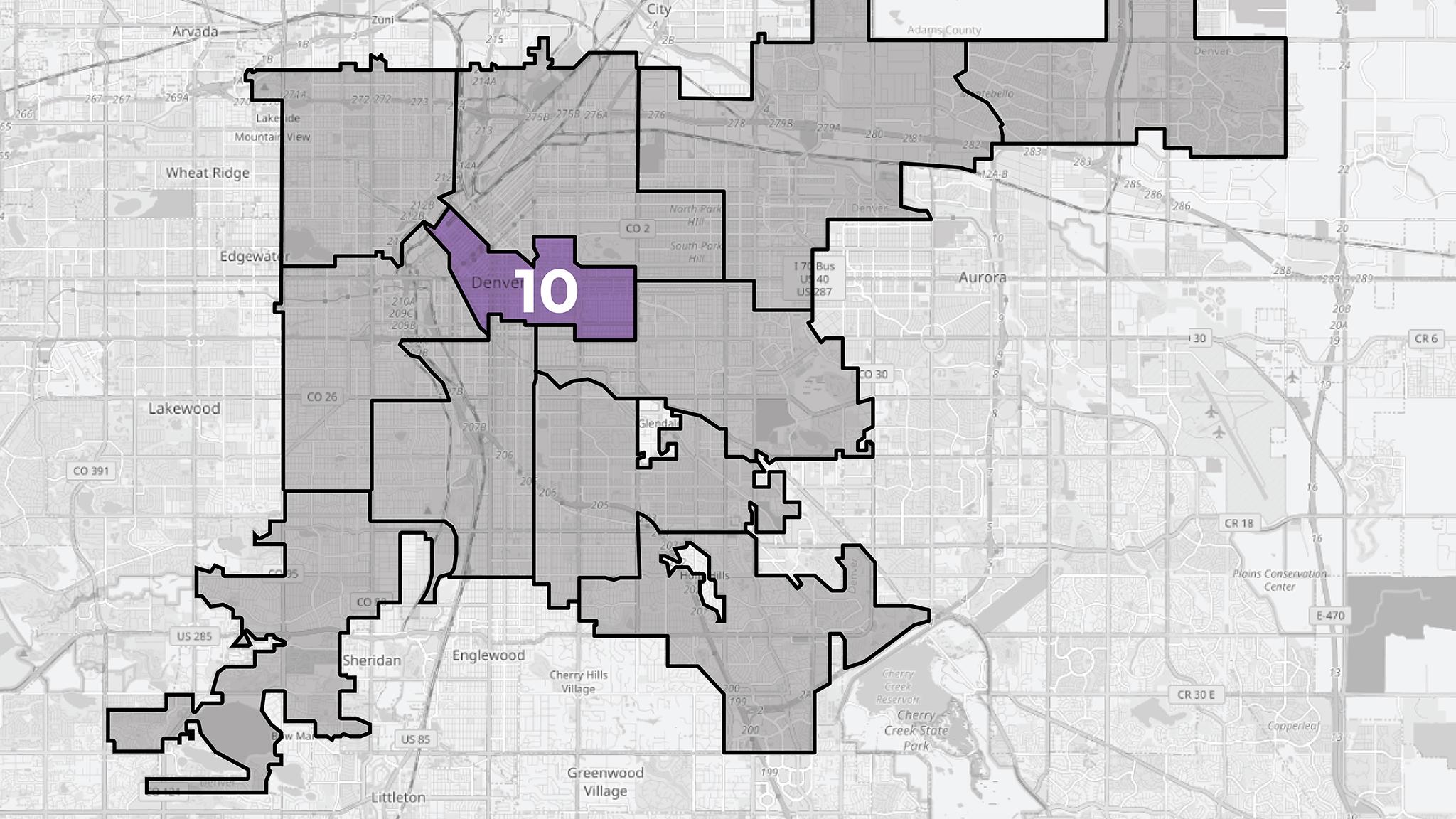District 10 includes Congress Park, west and south City Park, Cheesman Park, most of Capitol Hill, Civic Center, Central Business District and Union Station. Those last two neighborhoods are new, as of redistricting (and if you live in Country Club and Cherry Creek, you're now part of District 5; if you live in the Speer neighborhood, you're now part of District 7).

Who's Running?
District 10 residents have four candidates to choose from, including an incumbent and a few political newcomers. Here's who's running, in the order you'll see them on the ballot:
Margie Morris
Margie Morris is a relative newcomer to Denver, moving to the city in 2019. She has a background in finance, nonprofit leadership and consulting, and is running as a one-issue candidate, focused on homelessness. She wants to enforce the urban camping ban, but has said the city should "reframe" sweeps in a more "positive" way. She also wants Council to create a separate committee on homelessness, rather than as a part of the Safety, Housing, Education and Homelessness Committee.
"One of the things that really drew us to Denver, in particular, is the people," she said. "It's a great city. It's got a cool vibe. It's super outdoorsy. We love that about it."
Shannon Hoffman
Shannon Hoffman brings experience in social activism to the District 10 race, from her work with the Montbello Organizing Committee to a project with Emancipation Theater on housing. Her top issues are tenants' and workers' rights, housing, transparency and sustainability -- she herself is a renter. She's in favor of rent control, city-owned and operated social housing, investments in RTD and more green space.
"The council person is really the conduit and vessel for the community," Hoffman said. "The community brings the best ideas forward and we legislate them."
Chris Hinds
Incumbent Chris Hinds won his seat four years ago, after advocating for disability rights as a citizen. In his past term, he's proud of his work raising Denver's minimum wage, requiring affordable housing in new development and expanding the Support Team Assisted Response program (STAR). Looking to a second term, Hinds wants to make the city more accessible for people with disabilities, work on the 5280 trail and shared streets and continue buying up motels for housing.
"I think we're doing some really good stuff in the city and I would love to have the opportunity to return to effect more change on behalf of everyone in Denver," he said.
Noah Kaplan
Noah Kaplan brings a background in education to the race, returning to his alma mater, East High, to teach and coach speech and debate. His top issues include education, housing, homelessness, public safety and climate, and has said that he and his fellow teachers have personally struggled with affordability. He wants to continue public-private partnerships to convert motels and offices into housing, grow assistance for city workers and improve mental health resources.
"In many ways the political world here in the city and the country is largely inaccessible to people who don't have big financial backings or big connections," he said. "I was really excited about the opportunity to run as a Fair Election Fund candidate, which gave me the opportunity to be competitive in a local race where I otherwise wouldn't have had that chance."
What's going on in the district?
Encompassing much of downtown and multiple Denver parks, there's a lot going on in District 10. The district faces many of the top issues making the rounds this election cycle, including housing, homelessness, affordability and public safety. Revitalizing downtown has also been a major talking point this election cycle, with candidates calling for everything from bringing workers back in person to converting offices into housing.
One of the biggest divides this election has been over the urban camping ban, sweeps and the city's treatment of people experiencing homelessness. A lot of this happens downtown, where advocates have long called for an end to the sweeps and more public bathrooms and water fountains for people living on the streets. A few months ago, rocks meant to prevent people from camping also blocked off bike parking in the district. Meanwhile, downtown business say rising homelessness is hurting business.
The district has also had a range of challenges with public space. At the end of 2021 the city temporarily closed Civic Center citing safety concerns, relocating many people experiencing homelessness. And with the addition of Union Station in redistricting, District 10 has inherited long-standing debates over safety, policing, homelessness and drug use at the station. Also on the public safety agenda are worries over fentanyl use and a new police investigative unit, last summer's police shooting in LoDo and concerns about crime in general.
There's a lot of renovations going on in the district, including a three-week closure of the Denver Central Library and ongoing construction at 16th Street Mall (plus the Congress Park pool, which reopened last summer). Speer Boulevard runs along District 10 and will see upgrades, along with the rebuilt Larimer Street Bridge. Then there are worries about scooter safety, and the ongoing debates over bike lanes, parking and general transit accessibility.
On a neighborhood-specific level, Capitol Hill has seen its fair share of development, from over 100 new income-restricted units to a proposal from a church to become a developer with plans for affordable housing. One group of residents in the neighborhood turned a mansion into cooperative living, and a commercial strip along Colfax has faced struggles.
Congress Park residents have voiced frustration with a new trash collection system that picks up from some streets rather than alleys, which the city says is safer for workers and infrastructure but which residents say is harder for older people and those with disabilities. And in City Park, a historic home is up for sale, subject to legislation in the State Capitol.
Need more help voting? Check out the rest of our voter guide here.













